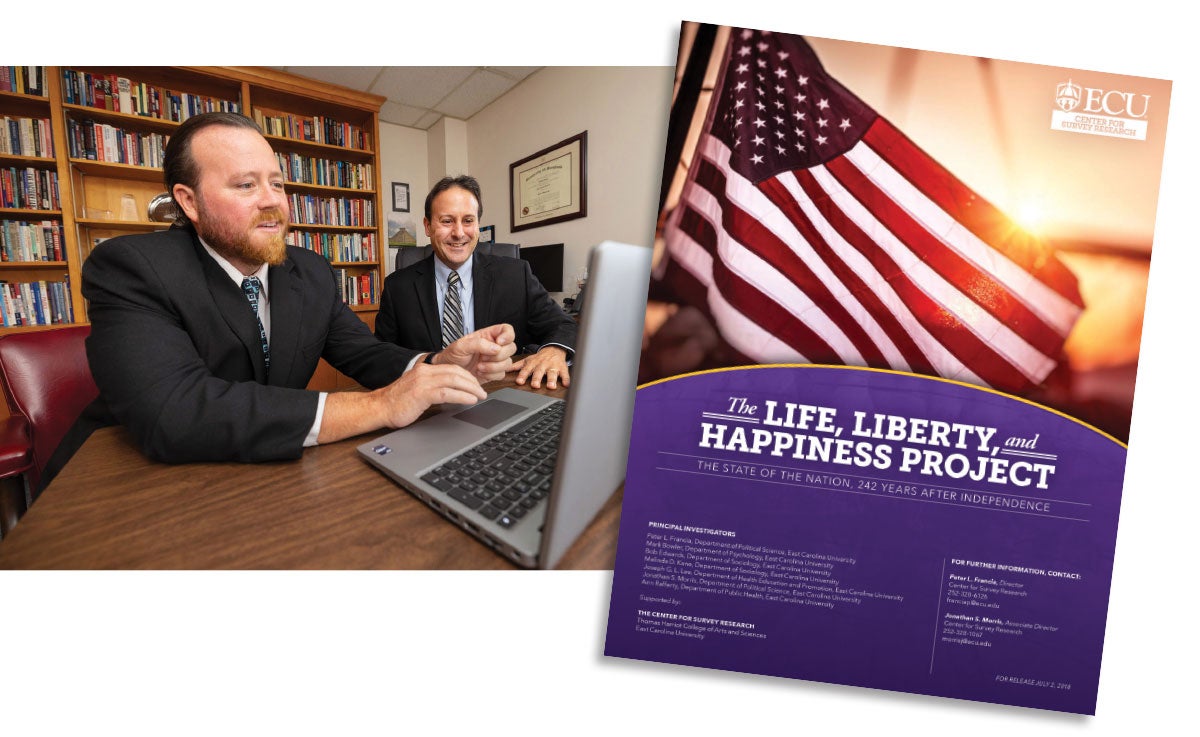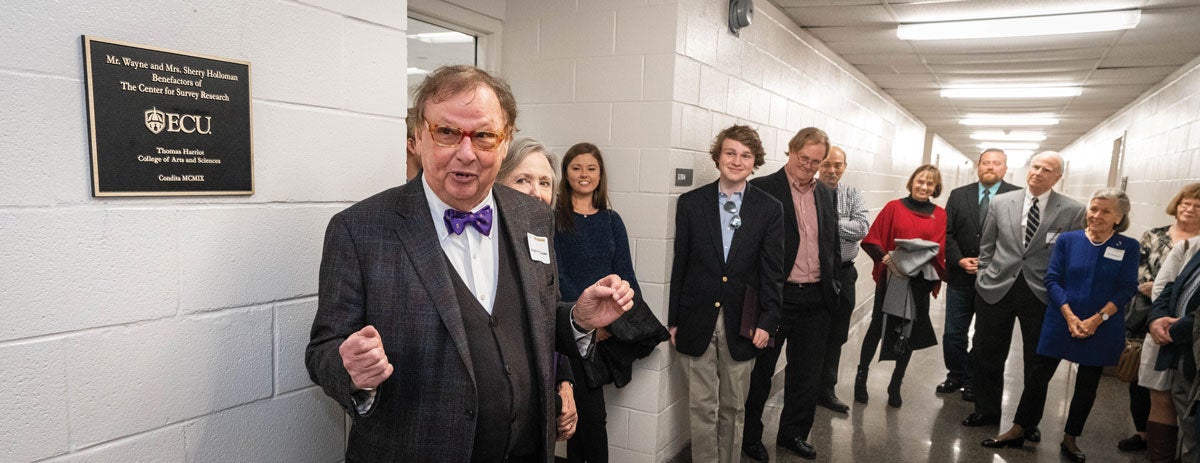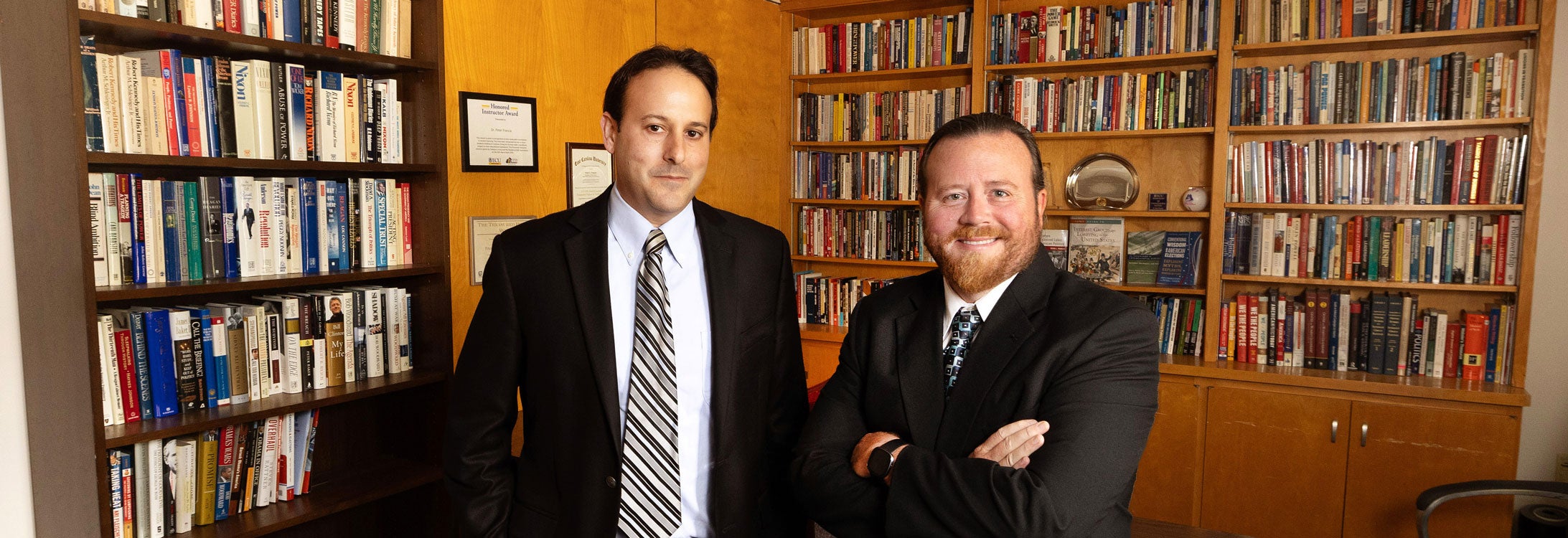Navigating the Numbers
Center for Survey Research earns ECU national recognition with its work
Campaign ads and stump speeches signal the start of another election cycle that will be watched closely in East Carolina University’s Center for Survey Research.
Six years ago, with seed funds from an ECU alumnus, the center added election polling to its scope of work and, in the process, has earned national recognition for the university as a reputable and reliable polling source.
Two people lead the center: director Peter Francia and senior polling scientist Jonathan Morris, longtime faculty members in ECU’s Department of Political Science in the Thomas Harriot College of Arts and Sciences.
Methods and impact
The Center for Survey Research has sampled public opinion on a range of topics including legalized sports betting, vaping and e-cigarettes, gun control, impeachment, COVID-19 and the Russia-Ukraine war.
The center’s first national survey, developed by researchers in ECU’s departments of public health, political science, psychology and sociology, asked about the nation’s founding principles of life, liberty and happiness.
“So many researchers, businesses and community members have important questions to ask, and they know they can get high-quality information and insight by leveraging the expertise of ECU’s Center for Survey Research,” says Dean Allison Danell of the Harriot College. “These survey results help our society understand complex issues and appreciate the role ECU plays in helping address them.”
Francia and Morris work with vendors to collect information from people via phone, online and text-to-web, which sends a survey link in a text message. The center added the technology in 2022, and it has helped improve accuracy, because almost everyone has a cellphone, Francia says.
Once data is collected, Francia and Morris take the mixed-mode survey data files and combine the results into one dataset.
“Then the fun begins, because you have to look at what you ended up with, and you have to pay close attention to your demographics and some other factors,” Francia says. “Then you weight the data, so that it looks like the electorate that you expect. There’s some statistics, math and a little bit of estimation based on past exit poll results.”
ECU’s poll for North Carolina’s 2022 Senate race between Ted Budd and Cheri Beasley was well within the margin of error. In Georgia, the center accurately predicted a runoff between Democratic Sen. Raphael Warnock and his Republican challenger Herschel Walker, although some pollsters had expected Walker to win outright in a red wave of support.
“I went into my campaigns and elections class that Tuesday and told my students, ‘I have to trust my numbers, and I’ve told the press that I think we’re headed for a runoff. But I’m nervous,’” Francia says. “We ended up being right, and that felt great.”
Political consultant Karl Rove, advisor to President George W. Bush, singled out the center for its call on the Georgia races. RealClearPolitics ranked the center near the top for accuracy in 2022 among regional and statewide polling organizations. Closer to home, the North State Journal and Carolina Forward noted the accuracy of ECU’s 2022 election polling.
“On election night, you really don’t want to be wrong. I guess if we were, we’d have plenty of company. A lot of good pollsters have missed, by a lot, in some places,” Francia says.
The center has also surveyed registered voters in Ohio, South Carolina and more recently in West Virginia. In May, the ECU poll asked about a hypothetical 2024 U.S. Senate matchup between Republican Gov. Jim Justice and incumbent Democratic Sen. Joe Manchin. The poll showed a significant 22-point lead for Justice, spelling trouble for Manchin. The results were immediately picked up by national political observers, including David Axelrod, senior political commentator on CNN and chief strategist for President Barack Obama’s campaigns.
“We were the first to poll it. That was news. Sometimes it’s timing and sometimes it’s your results saying something that is newsworthy; it’s just as simple as that,” Francia said.
Manchin announced in early November he will not seek re-election.
Between 2020 and 2022, the center generated roughly $12 million in earned media. Francia has been interviewed by CNN, National Public Radio, The Washington Post and The Wall Street Journal as well as local, regional and statewide outlets.
Retired News & Observer political reporter Rob Christensen says he talked to a lot of voters in his 45 years in Raleigh. “But you can never be sure that you are talking to a cross section of voters,” he says. “The polling done by the ECU Center for Survey Research provided invaluable hard data about what voters were thinking. Peter Francia was someone who I relied on to help interpret not only the polling but share his wisdom about North Carolina and national politics.”
Nonpartisan, objective research
Francia and Morris are members of the American Association for Public Opinion Research and its regional chapter, the Southern Association for Public Opinion Research, where Francia serves as president. The CSR is an institutional member of the Association of Academic Survey Research Organizations.
The CSR is a nonpartisan organization, dedicated to objective polling and surveys. “Our statistics are objective. Our reports are objective,” Morris says.
Still, people can get upset by questions or results. “We get complaints calling us leftists; we get complaints calling us ultra-conservative. We figure if both sides, especially the extremes, are complaining about our work, we’re doing OK,” Morris says.
“We’re not trying to convince anybody of anything. We are providing as accurate an estimate of what groups of the public are thinking about given political or social issues at the time,” Morris says. “You can’t cover politics and social issues without ruffling some feathers. We’re fine with it because we know that we do everything we can to be objective.”
The team works hard to generate clear questions without bias. “We want to be as straightforward as possible,” Morris says. “We don’t want to ask anything that’s going to be confusing or leading.”
ECU undergraduate students learn about public opinion polls and how to construct objective, clear, measurable questions that are unbiased. Political science students review data analyses to replicate findings and conduct their own polls each semester. “It’s fun to show the students the nuts and bolts of the process and that there are correct ways to measure public opinion and there are incorrect ways to do it. The correct way isn’t necessarily intuitive,” Morris says.

In July 2019, the center released the findings of its first national survey on Americans’ attitudes and behaviors on topics related to the nation’s founding principles.
ECU alumna Brittany Meier worked in the center as a doctoral student from August 2020 through May 2022, conducting research independently and with other students, professors and professionals within and outside ECU. She developed surveys, collected data, cleaned and analyzed data, wrote and edited articles and briefs, prepared presentations and reports, and did consultations. She now works for a Boston-based independent market research firm.
“During my time in the center, I improved my data analytic skills, my confidence as a consultant and knowledge of various tools and practices,” Meier says. “I learned more about numerous fields of study. This has helped me approach my current consultative, analytic and reporting work thoughtfully, collaborate with cross-functional and cross-disciplinary teams, and continue to learn new skills.”
Meier says the center’s strengths begin with its dedicated staff and its location at ECU. “As a knowledgeable and collaborative team, they share insights and add value to each other’s interpretations of sound statistical research. This, mixed with years of experience, means the center staff can effectively predict trends and results, and report on findings in meaningful ways,” she says.
Looking ahead
CSR activities will gear up with the South Carolina Republican presidential primary in February, one of the earliest primaries in the country. The center will poll the N.C. Republican presidential and gubernatorial primaries before turning to general election polling in North Carolina, Georgia and Ohio in October.
“We’re getting more comfortable with what we’re doing, we’re getting more efficient in fielding polls, writing the reports, publishing the reports, and then getting them into the news very quickly, but each poll costs money, and our funds are finite,” Morris says.
The work would not be possible without ECU alumnus Wayne Holloman ’64 and the center’s advisory board, which raises funds to supplement ECU’s in-kind support and stipend, Francia says. This fall, ECU University Advancement secured an anonymous gift for the center that will provide $50,000 this fiscal year.
“ECU has done a very good job of giving us time to concentrate on polling research during primary season and general election season,” Morris says. “We have the willingness to poll as many competitive races as we can.”
The center doesn’t have its own calling center or staff and must outsource those activities. Some undergraduate students have had unpaid internships although the center would like to grow its capacity to employ and teach students in the center. “We have to be very smart with how we allocate our resources,” Morris says.
Quinnipiac University, Marist College and Monmouth University have increased visibility and raised their respective profiles through election polling, which can serve as models for what the CSR can achieve, Francia says.
“We’re helping to raise the public profile of the university, and it’s rewarding for us when we hear our research be mentioned alongside a CNN poll or other nationally known polling houses like The New York Times,” Morris says. “We’re mentioned on equal footing with a lot of other prominent polling organizations. And the more we do this, hopefully the more commonplace that will be.”
Facts About the ECU Center for Survey Research
- It started in 1989.
- It conducts election polls, issue polls, university surveys and more.
- It offers services including survey design, data cleaning and analysis, and report writing.
- It has conducted election polling in five different states.
- It has polled on topics such as sports gambling, vaping, COVID-19 mandates, gun control and more.
- It has worked on projects for the Greenville ENC Alliance, the N.C. Chamber of Commerce, the Brody School of Medicine and Wahl-Coates Elementary School.
- Between 2020 and 2022, it generated an estimated $12 million in earned media.
More information is on the Center for Survey Research website.

Wayne Holloman speaks during the Center for Survey Research dedication in 2018.
Holloman donation makes election polling possible
The ECU Center for Survey Research started election polling with the support of ECU alumnus Wayne Holloman ’64.
A plaque recognizing the philanthropy of Holloman and his wife, Sherry, hangs just outside the entrance to center director Peter Francia’s office in the Brewster Building. “None of this is possible without Wayne, and that’s not an exaggeration. Without his generosity, we could not have done election polling,” Francia says. “And the (advisory) board has given money as well.”
Holloman and Francia met through the ECU Department of Political Science’s John East Scholarship, named for the late U.S. senator and political science professor. Holloman was a close friend of East and endowed the scholarship in 2000. Francia is a member (now chair) of the committee that distributes the $7,500 annual scholarship.
In 2017, the center moved from the then-Office of Innovation and Economic Development to the Thomas Harriot College of Arts and Sciences. Francia was named director, starting in January 2017 with a $5,000 budget. He brought in a guest lecturer from MIT and began thinking about next steps.
A few months later, Francia bumped into Holloman at a restaurant. Francia told Holloman about becoming director for the center and shared his vision for a combination of election polling and survey research on a range of issues impacting people’s lives.
Holloman remembers the conversation. “He pointed out to me how it could be a huge asset to the political science department and how much recognition ECU could get from it, and how beneficial it can be to the university. It would be nonpartisan, which it is. There’s no partisan lead to it,” he says.
ECU could get positive national media coverage with political polling, but the center lacked the financial resources to do it. “I listened to him and thought about it, and I said, ‘You know, Peter, I think you’ve got something, and you ought to drive the train. The person who drives the train is the one that’s going to make a success of it.’”
Holloman committed to giving $25,000 a year for four years — $100,000 — as seed money for the center. When that four-year period was up, he pledged another $25,000 a year for four more years through 2025.
“My hopes for the center are that they will continue to get the support they are getting from the university, and they will offer courses, student employment, research and internships,” Holloman says, adding an academic minor or major could possibly be developed to attract prospective students. “And we will continue to do more polling, not all political polling by any means. It should be diverse in its polling.”
In addition to the center and political science department, the Hollomans have supported Honors College programming and the Voyages of Discovery lecture series, the ECU Health Foundation and ECU Athletics. Wayne Holloman served on the board of directors of the ECU Foundation, the ECU Real Estate Foundation and ECU Alumni Association. Sherry Holloman served on the Thomas Harriot College of Arts and Sciences Advancement Council.
